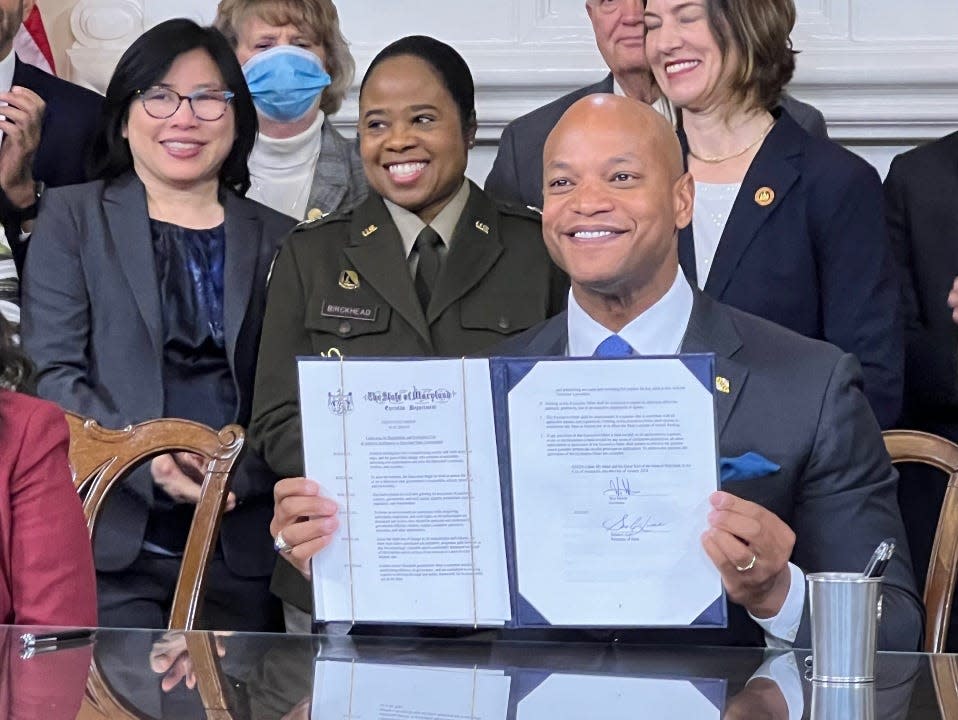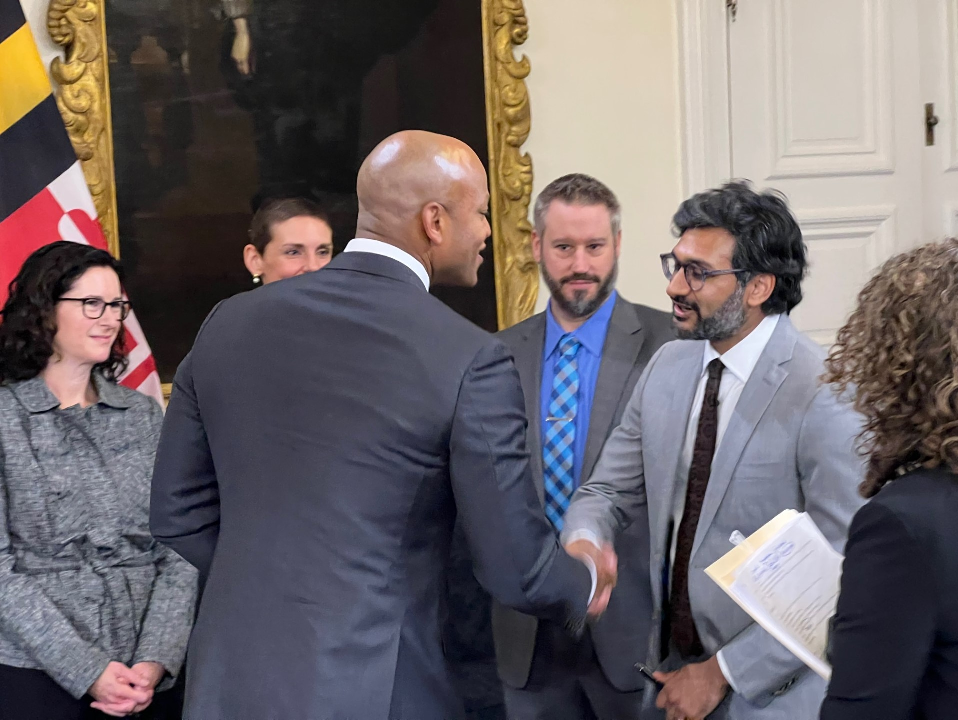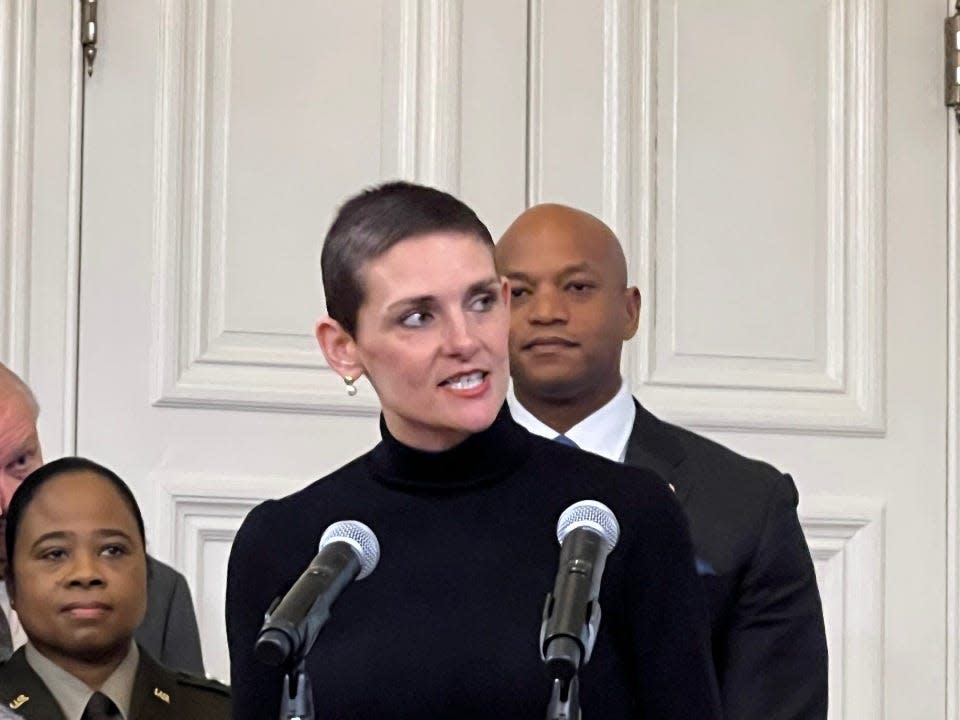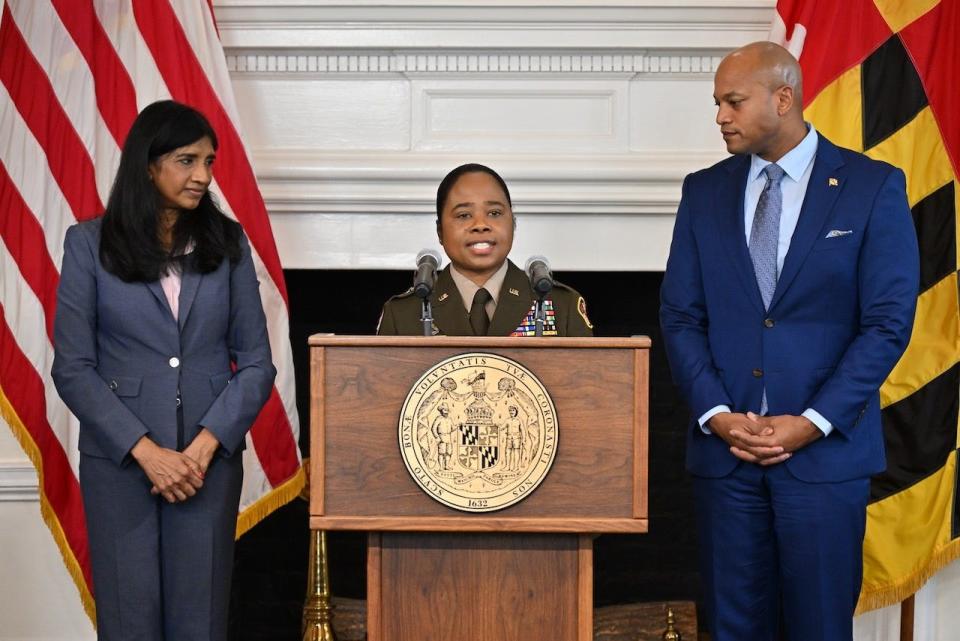Gov. Moore takes action on artificial intelligence; here's what's in new executive order
In what some statesmen and technology executives have called the “Age of A.I.,” there’s apparently something still to be said for the power of the pen.
Maryland’s Gov. Wes Moore signed an executive order on artificial intelligence on Monday, handing one of the ceremonial writing implements afterwards to the individual charged with harnessing the technology for the state’s government.
“Our constituents deserve a government that has the tools to be able to lead,” said Moore, a Democrat, during an announcement at the State House of four initiatives, including the executive order, designed to improve the digital experience for Marylanders.

Moore’s Secretary of the Department of Information Technology Katie Savage outlined the executive order as well as the creation of a Maryland Digital Service team, a digital accessibility policy for the state, and a cybersecurity partnership with the Maryland National Guard before the state’s chief executive, on the cusp of starting his second year in office, stepped to the lectern.
“In our first year, we learned that it isn’t enough to rebuild state government,” said Moore, “we actually need to modernize state government too.” He compared the moves to a “software update” for his iPhone, adding that the secretary’s announced steps “will ensure that we integrate AI into the work of state government in a responsible and an equitable way.”
More: Maryland’s new Artificial Intelligence advisor starts as legislator calls for privacy law
Moore signs artificial intelligence executive order, legislation may follow
It was Nishant Shah, the state’s new senior advisor for responsible artificial intelligence, who received one of the signing pens from the governor after Monday morning’s event.
In an interview after the signing ceremony, Shah said the executive order covers a “range of different things,” including the promotion of responsible and ethical use of artificial intelligence as well as guidance on how to use the technology productively. He said the order created an AI subcabinet “to ensure that we have the right people at the table making the decisions,” referencing those at state agencies, in academia and industry as participants who would examine artificial intelligence’s effect on economic development, security, and the workforce.

“There’s a lot of research happening across the country in this,” said Shah, “but these are spaces where we need really Maryland-specific understanding in order to craft the proper mitigations (and) opportunities.” He called part of the subcabinet’s work “horizon scanning.”
State Sen. Katie Fry Hester, D-Howard/Montgomery, said the Maryland General Assembly (which is scheduled to start its session on Wednesday) has been “working on artificial intelligence for a long time.”
The committee held multiple hearings on artificial intelligence in the past year, and Hester said she has five bills on that topic that she’s working on. (As of Monday morning, no bills had been filed before the session by Hester on the topic of artificial intelligence.)
More: Is Maryland prepared for artificial intelligence? Here's how state, US are preparing
Hester, a co-chair of the Joint Committee on Cybersecurity, Information Technology and Biotechnology, said she likes the governor’s executive order because it “sets the tone---We’re not going to be afraid of AI. We’re going to use it ethically and responsibly.”
“Now our job as the Legislature is to make sure everything’s in place to make it work,” said Hester, during an interview in the Governor’s Reception Room after the signing ceremony. “Timeline, budget, accountability, and details.”
Creating a Maryland Digital Service team and a digital accessibility policy

During a press conference with reporters, Savage, like Shah, an alum of the United States Digital Service (an organization created in the Executive Office of the President during the Obama Administration in 2014) called the creation of the Maryland Digital Service team a move to bring “talent to better support the budget we already have.”
In the post-event interview, Shah called artificial intelligence a “technology,” adding that a “digital service are a set of humans who are really good at building and leveraging technology.” He said those types of people are needed “in house,” working within the state’s government.
With local entities like Dorchester County Public Schools still determining how to use applications of artificial intelligence like ChatGPT, Shah expressed his desire to have much of the state’s work “open and published.”
“If we have generative AI guidance,” he said, “make that available to counties and municipalities.”
Evictions rising in Maryland: Evictions, rising after rent assistance ran out, back near pre-pandemic levels in Maryland
Savage said the state’s digital service team “will partner with agencies to create consistent and intuitive digital experiences that are user-centered and accessible to all Marylanders,” noting that the creation of the team alongside the rollout of the state’s digital accessibility policy was “intentional.”
The policy aims to make state websites and other information technology services have “the highest degree of usability for everyone,” according to a press release from the governor’s office. The state’s Secretary of Disabilities Carol Beatty was one of a handful of other cabinet heads present for the announcement.

Also in attendance was Major Gen. Janeen Birckhead, who leads the state’s National Guard. She’s likely to be involved with the Maryland Cybersecurity Task Force that Moore and Savage announced the creation of on Monday.
According to the release from the governor’s office, the task force brings together cybersecurity experts from the Maryland Department of Information Technology, the Maryland Military Department, and the Maryland Department of Emergency Management in coordination with the Governor’s Office of Homeland Security for “proactive cybersecurity.”
Administration calls for partners for bills on privacy, artificial intelligence
In response to a question about whether legislation is needed to protect the privacy of citizens data, Savage said “we want to make sure that we’re doing that in house as best as possible.”
“It’s certainly something that in partnership with the General Assembly that if we need to further shore up, I know we have trusted partners that we can work with on that,” she said.
Moore, too, emphasized partnership with the Legislature while acknowledging the fears many have about the domains of artificial intelligence and cyber.
“It is not lost on me that for many people in our state the words AI and cyber can make some people scared,” said Moore, advocating for a proactive approach with regards to the technologies. “We look forward to partnering with the General Assembly to move forward with legislation centered on AI.”
Dwight A. Weingarten is an investigative reporter, covering the Maryland State House and state issues. He can be reached at dweingarten@gannett.com or on Twitter at @DwightWeingart2.
This article originally appeared on Salisbury Daily Times: Artificial intelligence focus of Md. executive order, bills may follow

